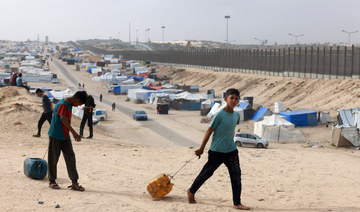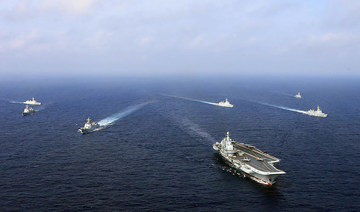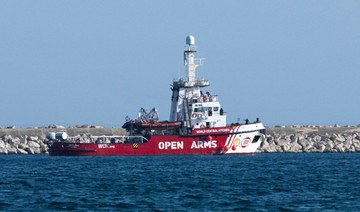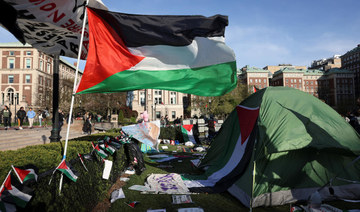ISLAMABAD: Chinese President Xi Jinping Tuesday hailed a $46 billion economic corridor as a “historic development opportunity” for Pakistan, but security fears linger over the project, which involves major construction in highly unstable areas.
Pakistani and Chinese officials on Monday signed more than 50 accords to inaugurate the China-Pakistan Economic Corridor, which will create a network of roads, railways and pipelines linking China’s restive west to the Arabian Sea through Pakistan.
The project is part of Beijing’s “Belt and Road” plan to expand its trade and transport footprint across Central and South Asia. It will give China easier access to Middle Eastern oil via the deepwater port of Gwadar in southwest Pakistan.
The Chinese plan also aims to boost Pakistan’s underperforming economy, which the IMF projects will grow 4.3 percent this year, and tackle its energy crisis.
Beijing and Islamabad have long enjoyed close ties and Xi’s speech to Pakistan’s parliament Tuesday was full of the flowery rhetoric that typifies their official exchanges.
“Today Pakistan has a historic development opportunity. Prime Minister Sharif has crafted the vision of the Asian tiger dream,” he told lawmakers before flying on to Indonesia for a summit.
But away from the handshakes and backslapping, there are real security concerns over much of the plan, which relies on developing Gwadar — control of which was passed to a Chinese company in 2013.
The port lies east of the Strait of Hormuz, through which much of the Middle East’s crude production passes.
But linking Gwadar to the rest of Pakistan and on to the western Chinese city of Kashgar, 3,000 km (1,860 miles) away, would involve major infrastructure work in Baluchistan.
This is one of Pakistan’s most unstable provinces and has been dogged for over a decade by a bloody separatist insurgency.
Ethnic Baluch rebels, who oppose Gwadar’s development while the province is not independent, have in the past blown up numerous gas pipelines and trains and attacked Chinese engineers.
Earlier this month the Baluchistan Liberation Front claimed an attack in the province that left 20 construction workers from elsewhere in Pakistan dead, the bloodiest separatist incident since 2006.
Siddiq Baloch, editor of the Balochistan Express newspaper, said the rebels want to scare off investors and developers who are working with the Pakistani government — such as the Chinese.
“There is the thinking that by doing this, they want to disrupt the working of the economy, disrupt the administration, challenge the administration in the area,” he told AFP.
Suppressing the rebellion by force in Baluchistan’s desolate and sparsely-populated landscape, much of which is desert and mountains, has proven difficult.
Abdul Malik Baloch, the Baluchistan chief minister, said strenuous efforts were under way to negotiate with the rebels.
“This is my honest opinion, this is the only way — to start talking and bring the insurgents to the table,” he said.
In a bid to allay fears, Xi’s Pakistani counterpart Mamnoon Hussain told him a special army division would be given responsibility for the safety of Chinese workers, a presidential source said.
Baluch rebels on Monday attacked an airport in Gwadar district, causing damage but no casualties, in a vivid reminder of the dangers.
Andrew Small, author of “The China-Pakistan Axis,” said China’s recent experience of working in Pakistan had given it a good idea of which projects could proceed in spite of security worries.
“China is certainly not completely confident that all the projects will be protected, but they think these security problems are one of the main reasons that it’s so important that they move ahead, for the sake of Pakistan’s stability,” he told AFP.
Even if not all the projects envisaged in the corridor plan went ahead, Small said, “the scale is so large that it should still have a major economic impact regardless.”
And while the Chinese projects dwarf an American assistance package to Pakistan of $5 billion that began in 2010, Small said Beijing was not interested in supplanting Washington in the region, preferring to see the US maintain its support.
Security fears for China-Pakistan corridor as Xi ends visit
Security fears for China-Pakistan corridor as Xi ends visit
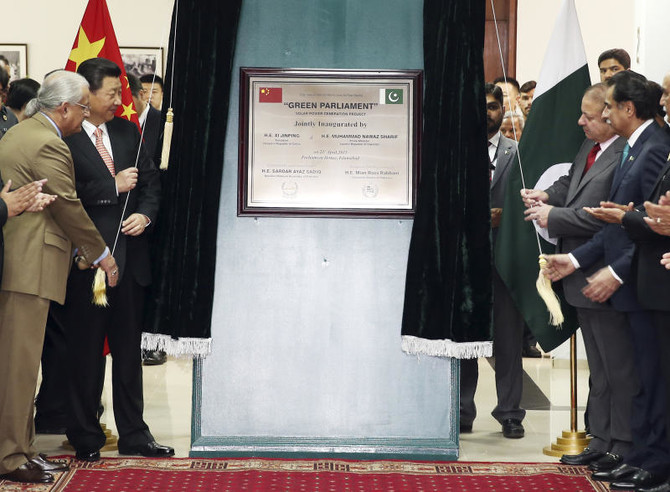
Pro-Palestinian protests keep roiling US college campuses
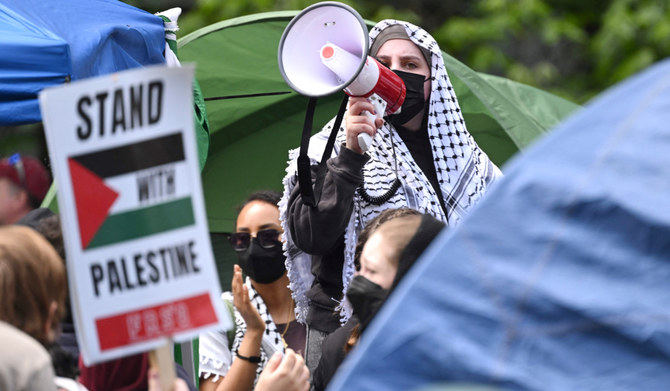
- Israel has killed more than 34,000 Palestinians, according to Gaza’s Health Ministry
- “They were expecting about 65,000 people on campus, and they just did not feel that it was going to be safe,” Bass said on CNN’s “State of the Union”
WASHINGTON: Pro-Palestinian protests at US universities showed no sign of slowing as they spread coast-to-coast over the weekend and police crackdowns and arrests continued into another week while students vowed to stay in tent encampments until their demands are met.
The students’ demands range from a ceasefire in Israel’s war with Hamas to calls for universities to stop investing in Israeli enterprises involved with the country’s military to an end for US military assistance for Israel.
Pro-Palestinian protests have spread to college campuses across the US, stoked by the mass arrest of over 100 people on Columbia University’s campus more than a week ago.
The Columbia campus was peaceful on Saturday and there were no reports of arrests of disturbances overnight, a school spokesman told Reuters.
But crackdowns continued at a handful of campuses on Saturday including a lockdown at the University of Southern California (USC) and a heavy police presence. More than 200 people were arrested at a handful of schools including 80 late on Saturday at Washington University in St. Louis. Among those arrested at Washington University was 2024 Green Party presidential candidate Jill Stein.
“They are sending in the riot police and basically creating a riot in an otherwise peaceful demonstration. So this is just shameful,” Stein said in a statement.
Washington University said in a statement that those arrested would be charged with trespassing.
On Sunday, dueling demonstrations were set to begin at the University of Southern California, Los Angeles. Outside groups were planning to demonstrate in favor of and against the pro-Palestinian encampments.
Members of the Harriet Tubman Center for Social Justice planned to support students’ right to protest.
In opposition, however, a group called Stand With Us will hold a “Stand in Support of Jewish Students” rally to “stand up against hatred and antisemitism.”
The nationwide protests have caught the attention of President Joe Biden.
White House national security spokesman John Kirby told ABC News on Sunday that the president knows there are very strong feelings about the war in Gaza.
“He understands that, he respects that and as he has said many times, we certainly respect the right of peaceful protest,” Kirby said. “People should have the ability to air their views and to share their perspectives publicly, but it has to be peaceful.”
Kirby added that the president condemns antisemitism and condemns hate speech.
At USC, leadership has canceled the main commencement ceremony after it called off the valedictorian speech by a Muslim student who said she was silenced by anti-Palestinian hatred.
Los Angeles Mayor Karen Bass said on Sunday she believed that canceling the commencement was a decision “they had to make.”
“They were expecting about 65,000 people on campus, and they just did not feel that it was going to be safe,” Bass said on CNN’s “State of the Union.”
China confronts Japanese politicians in disputed East China Sea area
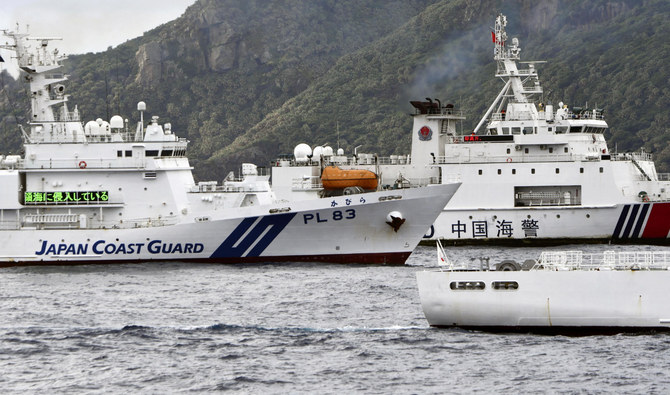
BEIJING/TOKYO: China’s coast guard confronted Japanese lawmakers in waters claimed by both countries in the East China Sea, China’s embassy in Tokyo and Japanese media said on Sunday, the latest in a series of maritime disputes involving China and its neighbors.
Chinese vessels took unspecified law enforcement measures, the embassy said in a statement, adding that it had lodged solemn representations for what it called “infringement and provocation” by Japan near tiny, uninhabited islands that Beijing calls the Diaoyu and Tokyo calls the Senkaku.
The Japanese group, including former Defense Minister Tomomi Inada, was on an inspection mission organized by the city of Ishigaki in Okinawa prefecture, according to the Chinese Embassy and Japanese public broadcaster NHK.
Japan and China have repeatedly faced off around the Japan-administered islands. China also has escalating run-ins with the Philippine navy in disputed areas of the South China Sea, where Beijing’s expansive maritime claims conflict with those of a number of Southeast Asia nations.
Inada’s group spent three hours near the islands on Saturday, using drones to observe the area, and the Japanese coast guard vessel sought to fend off the Chinese coast guard, NHK said.
“The government and the public are aware of the severe security situation,” said Inada, a senior official of the ruling Liberal Democratic Party, according to NHK. “The Senkaku are our sovereign territory and we need to go ashore for research.”
It was the first such inspection trip to the area involving a member of Japan’s parliament since 2013, NHK reported.
Officials of Japan’s foreign ministry were not immediately available for comment outside of working hours.
China strongly urged Japan to abide by what it called a consensus reached between the two countries, stop political provocations, on-site incidents and hyping up public opinion, the embassy said.
It asked Japan to “return to the right track of properly managing contradictions and differences through dialogue and consultation, so as to avoid further escalation of the situation.”
World Central Kitchen to resume Gaza aid after staff deaths in Israeli strike
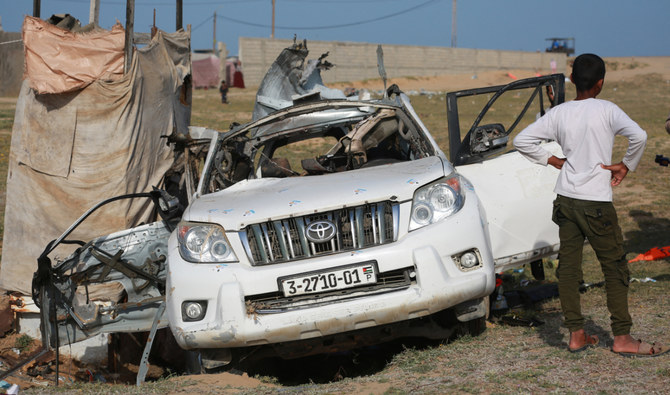
NICOSIA: World Central Kitchen or WCK said it would resume operations in the Gaza Strip on Monday, a month after seven workers of the US-based charity were killed in an Israeli air strike. Prior to halting operations, WCK had distributed more than 43 million meals in Gaza since October, representing by its own accounts 62 percent of all international NGO aid.
The charity said it had 276 trucks with the equivalent of almost 8 million meals ready to enter through the Rafah Crossing and will also send trucks into Gaza from Jordan.
“The humanitarian situation in Gaza remains dire,” said the charity’s chief executive officer Erin Gore.
“We are restarting our operation with the same energy, dignity, and focus on feeding as many people as possible.”
The April 1 deaths triggered widespread condemnation and demands from Israel’s allies, including the US, for an explanation.
Israel said its inquiries had found serious errors and breaches of procedure by its military, dismissing two senior officers and reprimanding senior commanders.
WCK is demanding an independent investigation. Israel’s six-month war against Hamas in Gaza followed an Oct. 7 attack by the militant group in southern Israel when more than 250 hostages were seized and some 1,200 people killed, according to Israeli tallies. Israel’s offensive has killed more than 34,000 people, Palestinian health authorities say, and caused a humanitarian disaster for the enclave’s more than 2 million inhabitants.
“We have been forced to make a decision: Stop feeding altogether during one of the worst hunger crises ever ... Or keep feeding knowing that aid, aid workers and civilians are being intimidated and killed,” Gore said.
“These are the hardest conversations, and we have considered all perspectives when deliberating. Ultimately, we decided we must keep feeding, continuing our mission of showing up to provide food to people during the toughest of times.” (Writing by Michele Kambas; Editing by Andrew Cawthorne)
White House urges ‘peaceful’ campus protests after hundreds arrested
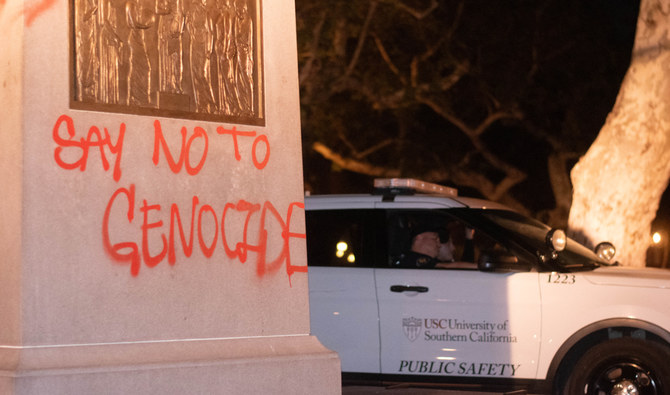
WASHINGTON: The White House insisted on Sunday that pro-Palestinian protests that have rocked US universities in recent weeks must remain peaceful, after police arrested around 275 people on four separate campuses over the weekend.
“We certainly respect the right of peaceful protests,” National Security Council spokesman John Kirby told ABC’s “This Week.”
But, he added: “We condemn the anti-Semitism language that we’ve heard of late and certainly condemn all the hate speech and the threats of violence out there.”
The demonstrations began at Columbia University in New York, but they have since spread rapidly across the country.
While peace has prevailed on many campuses, the number of protesters detained — at times by police in riot gear using chemical irritants and tasers — is rising fast.
They include 100 at Northeastern University in Boston, 80 at Washington University in St. Louis, 72 at Arizona State University, and 23 at Indiana University.
Among those arrested at Washington University was Green Party presidential candidate Jill Stein, who faulted police for aggressive tactics she said provoked the sort of trouble they are meant to quell.
“This is about freedom of speech ... on a very critical issue,” she told CNN shortly before her arrest on Saturday.
“And there they are, sending in the police and creating a riot.”
College administrators have struggled to find the best response, caught between the need to respect free-speech rights and the imperative of containing inflammatory and sometimes violently anti-Semitic calls by protesters.
At the University o Southern California, school officials late on Saturday closed the main campus to the public after pro-Palestinian groups again set up an encampment that had been cleared earlier, the school announced on X.
With final exams coming in the next few weeks, some campuses — including the Humboldt campus of California State Polytechnic University, have closed and instructed students to complete their classes online.
The activists behind the campus protests — not all of them students — are calling for a ceasefire in Israel’s war with Hamas and want colleges to sever ties with Israel.
Ukraine warns front ‘worsened’ as Russia claims fresh gains
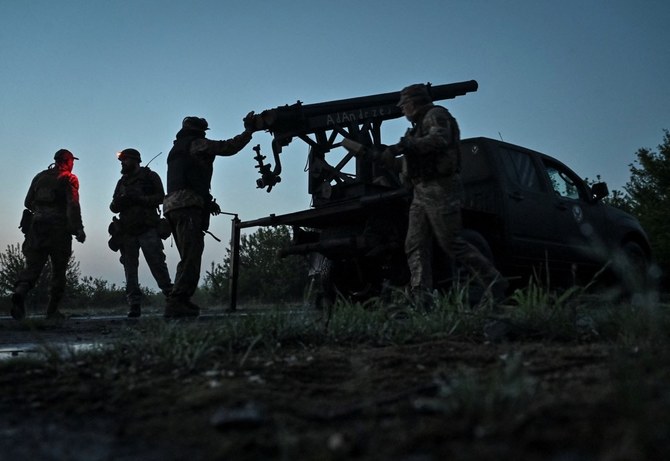
- Russia’s troops are advancing in the eastern Donetsk region
- The US finally approved a $61 billion package of financial aid
VOZDVYZHENKA, Ukraine, April 28, 2024 Agence France Presse: Ukraine’s army leader admitted Sunday that Kyiv’s position on the battlefield has worsened after Russian forces captured another village in the east, pressing their advantage in manpower and ammunition.
Russia’s troops are advancing in the eastern Donetsk region as Kyiv awaits the arrival of much-needed US weapons that it hopes will stabilize the fragile front lines.
“The situation at the front has worsened,” Ukrainian commander-in-chief Oleksandr Syrsky said in a Facebook post Sunday.
Ukrainian troops had “retreated” westwards to new defensive lines in a section of the front that runs past the city of Donetsk, controlled by pro-Russian forces since 2014.
Russia has “a significant advantage in forces and means” and had been able to notch up advances amid “heavy fighting,” Syrsky said.
“In some sectors the enemy had tactical success, and in some areas our troops managed to improve the tactical position,” he added.
Russia’s defense ministry earlier on Sunday claimed its troops had captured the village of Novobakhmutivka in the Donetsk region — around 10 kilometers (six miles) north of Avdiivka, which they seized in February.
The stark assessment of the picture facing Ukrainian troops comes at the end of week of ups and downs for Kyiv.
The United States finally approved a $61 billion package of financial aid after months of political wrangling, unlocking much-needed arms for Ukraine’s stretched troops.
But on the battlefield Russia chalked up more successes.
Its troops managed to make rapid advances in a narrow column to the northwest of Avdiivka.
In the village of Vozdvyzhenka, some eight kilometers from the fighting in Ocheretyne, AFP reporters saw civilians loading a small truck with furniture and belongings on Sunday.
“We’re going a long way from here... I don’t have time to talk because of the shelling,” one of them told AFP, before climbing into the vehicle and speeding out of the village.
Soldiers on the side of a road in the woods said they had originally been sent to build defensive lines.
“But the situation has changed. We were told not to take the shovels but to stay and wait for orders. The Russians are attacking and advancing,” one told AFP, speaking on condition of anonymity.
Syrsky confirmed on Sunday that Russia had made some “tactical” progress in that part of the front, but said Moscow had not yet achieved what he called an “operational advantage.”
He also said additional units were being deployed to replace those that had sustained heavy losses.
The recent setbacks have prompted rare criticism from Ukraine’s military bloggers.
“The (Russian) breakthrough near Ocheretyne revealed a number of problems,” the Deep State Telegram channel, with close links to the Ukrainian army, said in a post on Wednesday.
It said leaders of the 115th mechanized brigade, which is fighting in the area, were “responsible for the collapse of the defense in the entire sector, allowing significant losses.”
Kyiv’s forces are outnumbered across the battlefield, with the country struggling to recruit enough soldiers to replace those who have been killed, wounded or exhausted by the war, now in its third year.
Leaders in Kyiv have warned the military outlook could worsen in the next few weeks, while shipments of US weapons are making their way to the front lines.
“We are still waiting for the supplies promised to Ukraine,” said President Volodymyr Zelensky in his evening address Sunday.
Speaking after talks with Hakeem Jeffries, leader of the Democrats in the US House of Representatives, he said he had once again stressed the urgent need for Patriot anti-missile systems “as soon as possible.”
Ukraine’s head of intelligence at the ministry of defense Kyrylo Budanov said this month that the battlefield situation would likely be at its most difficult in mid-May to early June.


